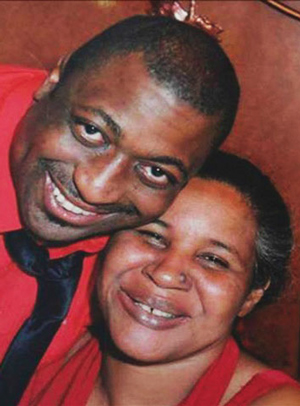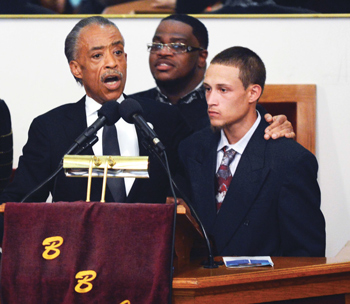Supporters of man who filmed death of Eric Garner by cops fears for his life
By Brian E. Muhammad -Contributing Writer- | Last updated: Apr 1, 2015 - 11:37:03 AMWhat's your opinion on this article?

Eric Garner and his wife Esaw Garner. Photo: MGN Online
|
Family and supporters claim Mr. Orta’s arrest on unrelated gun and drug charges was actually part of a targeted harassment campaign by the NYPD. They say it’s retaliation for the video that went viral giving worldwide exposure to the vile treatment of Black, Brown and poor people by law enforcement in the United States.
The infamous video showed the full altercation between Mr. Garner and Staten Island police including the illegal chokehold and his frantic pleading to his last breath of, “I can’t breathe” to the total disregard of the cops. Mr. Orta is being held on $100,000 bail or bond at Rikers Island Prison in New York. At Final Call presstime, Mr. Orta appeared in court with new lawyers March 30 and is scheduled to return May 28. Advocates express fear for his life in Rikers and are calling for his relocation.
“Ramsey Orta is under suicide watch because he’s refusing to eat,” said Danette Chavis of National Action Against Police Brutality, a response group to police brutality across America.

The Rev. Al Sharpton, left, introduces Ramsey Orta at the funeral of Eric Garner at Bethel Baptist Church in the Brooklyn borough of New York on July 23, 2014. Garner died in police custody after an offi cer placed him in an apparent chokehold. Orta shot video of the incident. Photo: AP/Wide World photos
|
Efforts are being made to shed light on what is happening to Mr. Orta who initially was hailed as a hero for recording the police killing of Eric Garner on video. But while Mr. Orta documented what happened, his back-story was given little attention.
Public focus was given to the video because of the heinous actions of the police, “but not to the person who took the video” said Student Minister Abdul Hafeez Muhammad, the New York Representative of the Nation of Islam.
The justice system chose not to indict any of the police in the video and observers say the NYPD placed a spotlight on Mr. Orta’s criminal record as a tactic of marginalization. They are livid because “this man, Ramsey Orta had the audacity to film them while they were committing a murder,” said, Ms. Chavis.
Critics accuse the police of often using past criminal records of a person they violate as a justification to validate their actions against the individual.
So they began to look into Mr. Orta; “his pattern and his ways … and whatever way they could find to discredit him; but they couldn’t discredit the video—but they went after him,” Student Minister Muhammad added. “It lets you know that the video was independent of the person who took the footage, but once the video went viral it became the world’s video.”
The exposure of police misconduct against Mr. Garner caused a problem for the NYPD.
The alleged harassment wasn’t limited to Mr. Orta. Another case involves 37-year-old Taisha Allen who also recorded the chokehold death of Mr. Garner. She claims she, too, is being targeted by police for her role in the case.
Ms. Allen said, in a recent encounter with the NYPD, she was badly beaten while attempting to help a friend being arrested at her apartment complex. According to Ms. Allen, police officers recognized her from the Garner case and made it an issue during the incident with her friend.
Speaking to RT Television Ms. Allen recalled the officer saying, “Oh wait, you’re the girl who taped [the] Eric Garner case,” and her response, “Yeah, but this doesn’t have anything to do with the situation, so could you tell me what’s going on?” It escalated from there to Ms. Allen being beaten and arrested. Ms. Allen was asked about Mr. Orta and if the actions of the cops against them are calculated.
“I don’t really know anything about his situation that’s going on, but I do believe that we are being targeted because we was there, and we watched what the NYPD did to Eric Garner, how they choked him out and he said that he couldn’t breathe,” she said.
In a March 13 Press Conference in Harlem, Ms. Chavis said, “We cannot have people who film police be the subject of targeting by police … being made out to be a criminal, when the police themselves are the criminals.”
There is a long history of police terror on Black and Brown people where the victim is criminalized before the public as a menace to society argue critics.
To grasp the NYPD response to the visual attention of the Eric Garner killing is to understand the institutional nature of police brutality and murder of young Black and Brown people in America, according to activist and former Political Prisoner Dhoruba bin-Wahad.
“Black people and people of color in this country think that police brutality is something exceptional, it’s something aberrational, it’s something that individual cops do,” Mr. Bin-Wahad said in a recent interview.
The persecution tactics, brutality and murder are part and parcel of a culture of “police control” of Black and Brown people in America and upholding a power equation driven by White Supremacy, he said.
Citizens recording and documenting police actions are legal according to the American Civil Liberties Union. Taking photographs and video of things that are plainly visible in public spaces is a constitutional right — and that includes the outside of federal buildings, transportation facilities; police and other government officials carrying out their duties.
“However, there is a widespread, continuing pattern of law enforcement officers ordering people to stop taking photographs or video in public places, and harassing, detaining and arresting those who fail to comply,” the ACLU website said. Over the years issues stemming from the problem have been fought in courts with victories.
Social activists argue that police continue pushback against being recorded regardless of constitutional First Amendment protections allowing it. Common high-tech phones document abuses in real time; and immediate access to the internet spreads information instantly. As a result the reach of the people’s resistance from Ferguson to New York in the fight for justice and accountability was expanded.
A 2014 Gallop poll revealed only 45 percent of Blacks view police as having honesty and high ethical standards after grand juries did not indict White police officers whose actions resulted in the deaths of Black men. The poll showed 68 percent of Blacks said the justice system is biased against them. The polling company cited “historical racial discrimination in the U.S. and life experiences” as probable reasons. The ongoing tensions between police and Blacks also factored in the more negative views of police whereas lenient “Whites’ views have largely held steady,” Gallop found.
Some are calling for more police reform, dialogue and training. In many cities budgets are being devised to purchase body cameras for police. But these are “cosmetic reforms that do not address the institutional relationship of law enforcement with people of African ancestry in this country,” Mr. Bin-Wahad argued. The institutional relationship is the same that existed during Jim Crow, sharecropping and the plantations. “The police are to regulate and control the movement, behavior and attitude of African people—that’s their job,” he said.
Ms. Chavis concluded that any change will require a national struggle.
“Nothing is going to effectively deal with the issue of police brutality and murder except a nationwide demand against it,” said Ms. Chavis.
INSIDE STORIES AND REVIEWS
-
-
About Harriett ... and the Negro Hollywood Road Show
By Rabiah Muhammad, Guest Columnist » Full Story -
Skepticism greets Jay-Z, NFL talk of inspiring change
By Bryan 18X Crawford and Richard B. Muhammad The Final Call Newspaper @TheFinalCall » Full Story -
The painful problem of Black girls and suicide
By Charlene Muhammad -National Correspondent- » Full Story -
Exploitation of Innocence - Report: Perceptions, policies hurting Black girls
By Charlene Muhammad -National Correspondent- » Full Story -
Big Ballin: Big ideas fuel a father’s Big Baller Brand and brash business sense
By Bryan Crawford -Contributing Writer- » Full Story






 Click Here Stay Connected!
Click Here Stay Connected!








